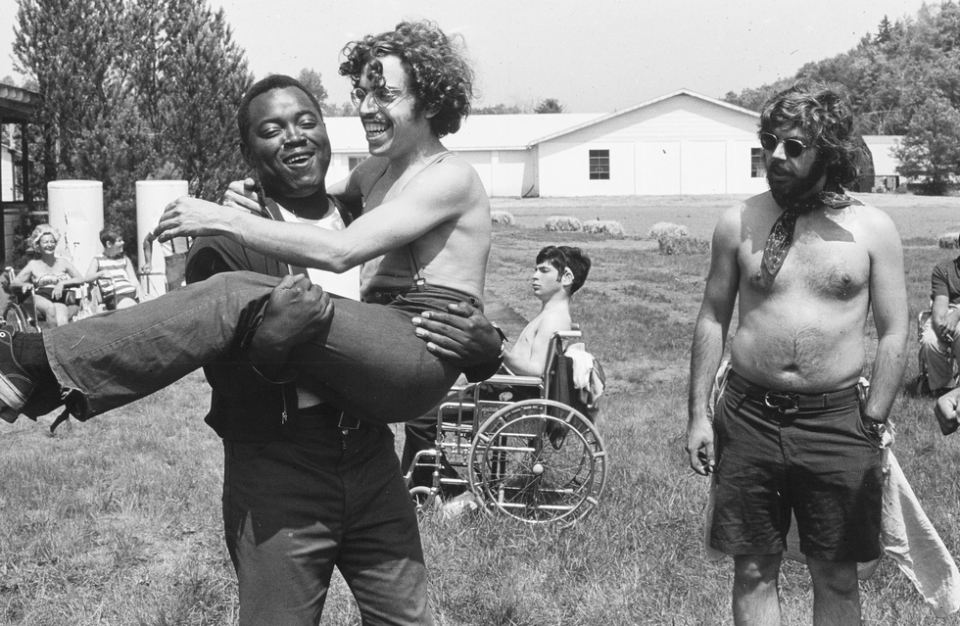'Crip Camp' Director Jim LeBrecht Describes Returning to Jened as Coming to "a Grave Site"

- Oops!Something went wrong.Please try again later.
Crip Camp: A Disability Revolution, the latest project from Barack and Michelle Obama's production company Higher Ground, is now available on Netflix.
Directors Nicole Newnham and Jim LeBrecht aimed to create a documentary that would highlight the history of the disability rights movement in the 1970s and Camp Jened's role in it.
The original Camp Jened was a summer camp for teens with disabilities in upstate New York. It closed down in 1977.
When you watch Netflix's new documentary Crip Camp: A Disability Revolution, you'll undoubtedly be inspired and curious to learn more about the disability rights movement in the 1970s that eventually led to the passing of the 1990 Americans with Disabilities Act (ADA). After all, shining a light on this overlooked piece of history was a large goal for directors Nicole Newnham and Jim LeBrecht (who stars in Crip Camp as a former camper).
"I think both of our hopes were that we could reframe how people think of disability and people with disabilities ... Maybe we should be treating people [and] thinking about people that are not like us in these fresh eyes and open minds, and realize that things are really not what they seem," Jim, who was born with spina bifida, tells Good Housekeeping about his desire for the documentary.

But apart from giving viewers a closer look into the lives and struggles of those with disabilities, Jim and Nicole also wanted to show how one summer camp for the disabled called Camp Jened encouraged greater action in the world. In the film, Jened is described as a space where teens with disabilities could escape their struggles and be themselves without fear of judgement. When Nicole first called up Judith Heumann, a key figure in Crip Camp and in the national disabilities rights movement, Judith told the director that she credits Jened's sense of community to inspiring some alumni to become activists.
"[Judy explained that] places like Camp Jened play an enormous role in sparking activism because they were the places where people gathered together and realized that they had similar problems and those problems were because of structural oppression," Nicole recalls.
So, whatever happened to Camp Jened?
Despite the film focusing on campers who attended Jened in the early 1970s, the camp actually opened at the foot of Hunter Mountain in upstate New York in 1951. Unfortunately, as we learn at the end of Crip Camp, Jened closed in 1977 due to financial issues. But what the film doesn't highlight is that Jened ended up reopening in Rock Hill, New York in 1980 and became part of the Cerebral Palsy Associations of New York State, according to Screen Rant. The site in Rock Hill eventually closed down as well, and now, there are talks of building a town park in the space.
Jim tells us that the last time he had visited Jened in its original location, prior to returning to film for the documentary, was in the summer of 1973. He never got to say a final goodbye to it before the grounds officially shut down. Now, Jim says it appears to be a service yard for a construction company.

"You recognize the land ... [but] you don’t see the buildings and also you don’t see the people. And there’s not this sense of joy and community, it’s just not there anymore," he recalls about returning back. "I don’t know if this sounds melodramatic but it’s almost like, we came into a gravesite, I think. You have love and respect, and bittersweet memories and some tears."
But while the physical camp may no longer exist, the lasting legacy of Jened will live on, as will his relationship with his fellow former campers and counselors.
"There’s an email list of about 48 people that have stayed in touch from New York to Israel to different places," Jim explains. "It's been really great to hear people and talk to folks and sharing experiences."
You Might Also Like

